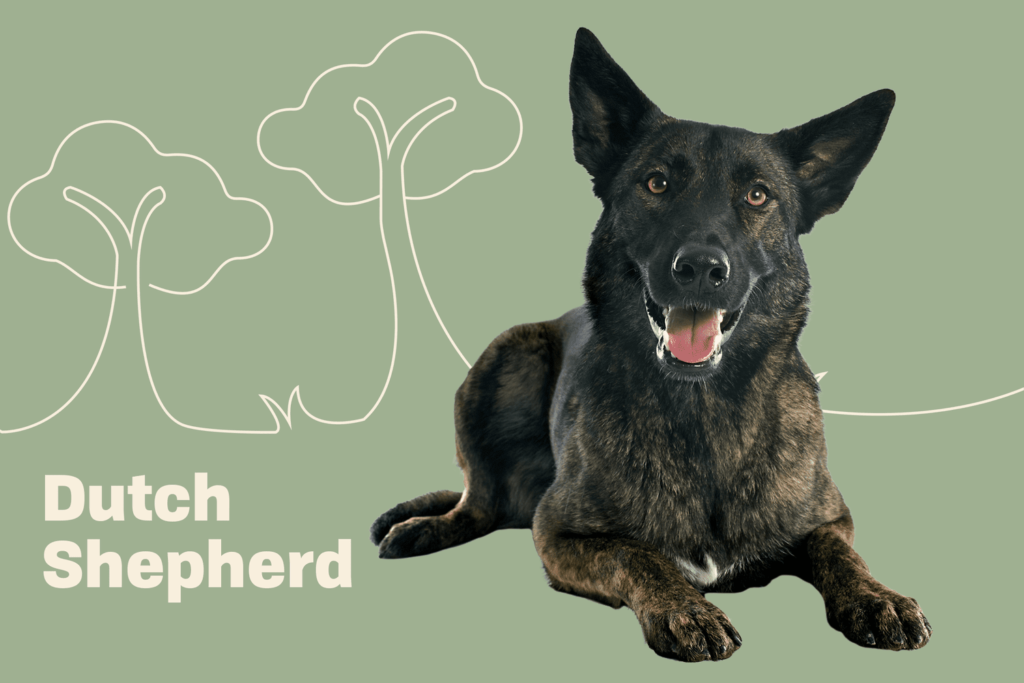Dutch Shepherd Breed

Dutch Shepherd Breed:- The Dutch Shepherd Breed is a medium-sized dog breed, standing between 22 to 25 inches tall and weighing anywhere from 55 to 75 pounds. Known for their intelligence, loyalty, and strong protective instincts, Dutch Shepherds excel as guard dogs and are often a preferred choice for various working roles.
Despite their protective nature, they also make excellent family pets due to their playful, affectionate, and energetic demeanor. While they are loyal to every member of the family, Dutch Shepherds are often considered “one-person” dogs, displaying the strongest attachment to one individual.

Unique Appearance and Coat
One of the most striking features of the Dutch Shepherd Breed is its coat, which is uniquely brindle in pattern. This brindle coloring can vary widely, featuring shades of gray, yellow, silver, red, gold, or even blue. The brindle pattern, particularly in some dogs, can create the appearance of stripes, giving them a tiger-like look. Their coat is one of the traits that distinguishes them from other herding breeds, even though their body type is similar.
The Dutch Shepherd’s Lineage
When searching for a Dutch Shepherd, it’s essential to understand the diversity within the breed. Many breeders focus on producing dogs strictly for performance, often creating dogs that resemble the Belgian Malinois in temperament and drive. These performance-bred Dutch Shepherds are robust and intense, designed for high-energy tasks such as protection, police work, and other demanding roles.
On the other hand, some breeders are dedicated to preserving the “pure” bloodlines of the Dutch Shepherd, with a focus on dogs registered under the FCI (Fédération Cynologique Internationale). This faction of breeders is working toward securing AKC (American Kennel Club) recognition of the breed in its pure form.
At our breeding program, we prioritize using only the best purebred, registered Dutch Shepherds. Our goal is to find a balance between the high drive of the Malinois and the solid work ethic of the German Shepherd. We believe that the ideal Dutch Shepherd should be versatile—able to work hard all day and then relax with the family at night. These dogs should not require an expert handler and should adapt well to various situations and environments.

Grooming Needs
The Dutch Shepherd comes in three coat types: short-haired, long-haired, and rough-haired. The grooming needs for each type vary, but none are particularly high-maintenance compared to some other breeds. Short-haired Dutch Shepherds need only occasional brushing, though they require daily brushing during seasonal shedding periods in spring and fall. Long-haired varieties require more regular grooming—about once a week—while rough-haired Dutch Shepherds need monthly grooming and twice-yearly hand-stripping to maintain their coat’s texture.
Regardless of coat type, it’s essential to keep the dog’s nails trimmed to prevent overgrowth, splitting, and cracking. Their ears should be checked regularly to prevent wax buildup and infections, and their teeth should be brushed to maintain good oral hygiene. Bathing can be done as needed, depending on the dog’s activity level and lifestyle.
Feeding a Dutch Shepherd
Feeding a Dutch Shepherd requires a consistent routine tailored to the dog’s age, activity level, and health status. Adult Dutch Shepherds typically do well on a twice-daily feeding schedule, with one meal in the morning and another in the evening. Puppies, on the other hand, may require more frequent meals to support their rapid growth and development. Consistency in meal times helps regulate digestion and prevents issues like bloat, a condition that can affect larger breeds.
The diet should be tailored to the dog’s life stage. Puppies should be fed puppy-specific food until they are ready to transition to adult formulas. Ensuring that the diet is nutrient-rich and balanced is crucial for maintaining the Dutch Shepherd’s energy and overall health throughout their life.
Training a Dutch Shepherd
Dutch Shepherds are highly trainable, excelling in environments that challenge their intelligence and physical abilities. Training a Dutch Shepherd requires consistency, positive reinforcement, and plenty of exercise. Without regular mental and physical stimulation, they may become bored, leading to destructive behavior. Ensuring that your dog receives enough exercise is key to maintaining their focus and keeping their sharp mind engaged.
Working with a skilled trainer who understands the specific needs of working breeds like the Dutch Shepherd can yield the best results. Early socialization is also important to help Dutch Shepherds grow comfortable in different situations and environments. Introducing them to new experiences, people, and other animals at a young age helps build a well-rounded and confident adult dog.
Shedding Considerations
Shedding is a consideration for any potential dog owner, and the Dutch Shepherd is no exception. While their shedding tendencies can vary based on their coat type, most Dutch Shepherds experience seasonal shedding periods. Short-haired Dutch Shepherds tend to shed the most during these times, while long-haired and rough-haired varieties shed more moderately.
Having proper grooming tools can help manage the shedding. Deshedding brushes, grooming gloves, and other tools designed to remove dead hair can be very useful, particularly during shedding seasons. Keeping the home clean from pet hair also becomes easier with tools like fur brooms, specialized vacuums, and tape rollers designed to pick up pet hair from clothing and furniture.

Common Health Issues
Despite their robust nature, Dutch Shepherds are not immune to health problems. However, compared to other shepherd breeds, they tend to be healthier overall. Reputable breeders perform health screenings to minimize the risk of passing on genetic conditions.
Hip dysplasia, a condition common in many large-breed dogs, can affect Dutch Shepherds as well. This condition can cause discomfort and mobility issues, so it’s essential that breeders screen for it. Another condition, goniodysgenesis, affects fluid flow in the eye and, in severe cases, can lead to blindness. This is more common in the rough-haired variety of Dutch Shepherds, though it remains rare. Additionally, a recently identified inheritable disease, inflammatory myopathy, has been found in Dutch Shepherds. This progressive disease causes muscle degeneration, though responsible breeding practices can help reduce its occurrence.
Conclusion
Dutch Shepherds are a versatile and robust breed, blending intelligence, loyalty, and protectiveness. Whether working as guard dogs, excelling in various performance roles, or simply being a loving family companion, they bring a lot to the table. With proper care, training, and attention to their specific needs, a Dutch Shepherd can be a rewarding and fulfilling addition to any family. Their unique brindle coat, strong work ethic, and loyal nature make them stand out, whether in the field or relaxing at home.
Also Read:-




